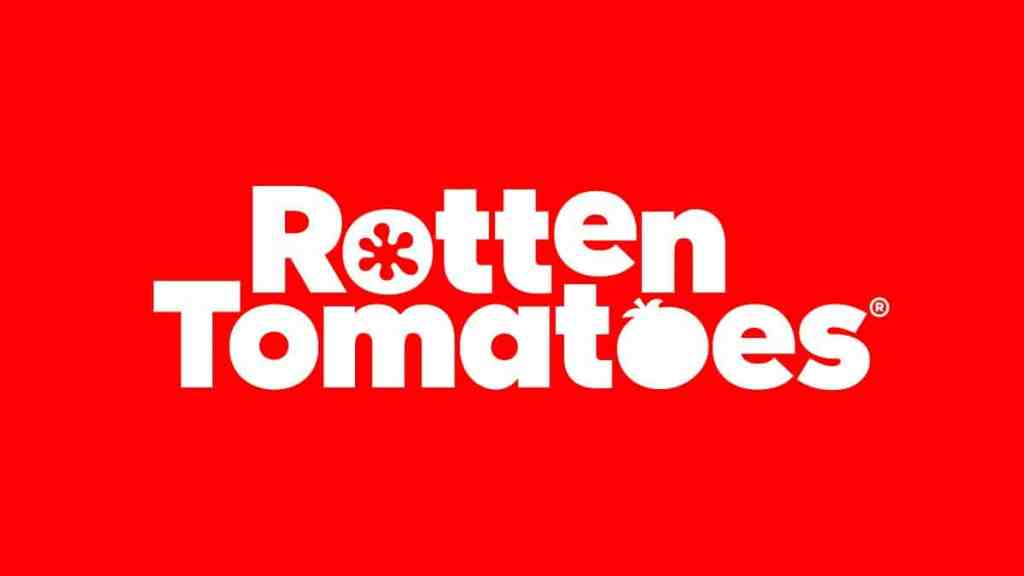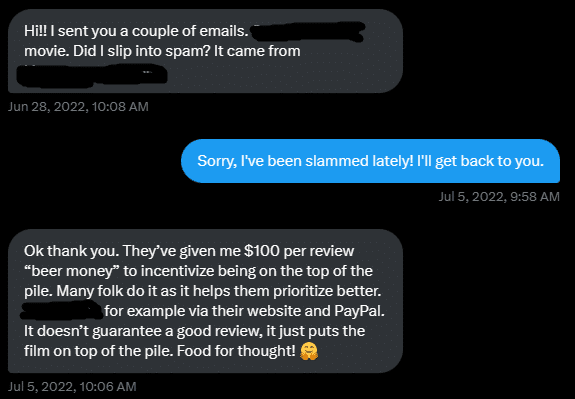In a damning piece by Vulture journalists Lane Brown and Luke Winkie, it was revealed that review aggregate site Rotten Tomatoes has been compromised by a US-based PR firm that pays writers to submit more positive, sales-friendly film reviews.
Bunker 15, the firm in question, would pay film critics $50 USD or more for each review, and prioritise sending the more positive ones to Rotten Tomatoes in a seeming attempt to bump up the aggregate score for films they managed. This practice reportedly went on for over five years.
One film, 2018’s Ophelia (starring Daisy Ridley) rose from an initial aggregate ‘rotten’ score of 46%, to a ‘fresh’ 62%, after such incentivised reviews were added to the site. Rotten Tomatoes denies knowing anything about this apparent manipulation, reiterating in the Vulture piece that they prohibit ‘reviewing based on a financial incentive’.
Read: Film Review: Ophelia – beyond the manic pixie drown girl
There is a certain irony to the situation, given that when founder Patrick Lee started Rotten Tomatoes in the 90s, he did so because he was angry at publications printing full-page movie ads ‘with good quotes about it, regardless of whether the movie was actually good or not.’ Lee and his co-founders, Senh Duong and Stephen Wang, instead wanted a place where you could see ‘all the good and bad reviews about a movie… and have a score for it.’ [Source: MediaWeek]
Rotten Tomatoes has since removed a number of Bunker 15 films from its site and sent a warning to writers who reviewed them. They are quoted in Vulture as saying: ‘We take the integrity of our scores seriously and do not tolerate any attempts to manipulate them. We have a dedicated team who monitors our platforms regularly and thoroughly investigates and resolves any suspicious activity.’

Are critics bought in Australia, too?
The situation described in Vulture is entirely US-specific – but that doesn’t rule out the possibility that positive reviews are being bought in Australia, too. From this writer’s perspective, it’s been alarming to see the rise of TikTok stars, YouTube celebrities and other social media influencers packing out film previews that are typically reserved for critics alone.
In my opinion, the business of being a film critic is one that requires passion, skill, and a robust education – whether that be from a top university, the neighbourhood multiplex, or an extensive media library on the family PC, it doesn’t matter. It’s an opinion-based profession, sure, which eliminates the need for objectivity, but being in the business of subjectivity still requires integrity at a minimum. If you don’t like a film, tell people you don’t like it. If you do like a film, tell them you like it.
‘We are living in a time where legitimate critical voices are being drowned out by “influencers” and niche celebrity endorsements,’ says Nadine Whitney, freelance film critic and co-chair of The Australian Film Critics Association. ‘It is reprehensible that there are certain “review influencers” out there who use their social media impact to push for certain films regardless of their quality. I’m not sure how the opinion of random person from MAFS factors into the critical conversation.’
Influencers aside, there is one Australian-based website, Whitney says, that she has seen ‘adjust ratings from their writers, to keep certain sponsors happy’. She attests that they also run ads for ‘gambling, vaping, and other such things disguised as film reviews’. We cannot name the site.
Whitney, who only recently became a ‘Tomatometer-approved‘ critic after writing for years across publications like the Alliance of Women Film Journalists and The Curb, says that she had also heard of some critics in Australia being approached by filmmakers and PR agents with financial incentives to write good reviews. ‘I am not one of them,’ she clarified. ‘My opinion is not, and will never be, for sale’.
Beer money
One Australian critic who was approached with such a proposition is Travis Johnson, a Sydney-based writer whose work appears in Metro, SBS Movies, and Flicks.com.au. He has been clear in saying that he turned the offer down, but the example is still an insight into how practices like that of Bunker 15 may be working in Australia.
On 28 June 2022, Johnson received a direct message on Twitter from a small publicist, asking him if he would write a review of an upcoming release they were handling. The publicist didn’t waste any time in offering him $100 in ‘beer money’ in return for a review that would make the film go to the ‘top of the pile’. They did go on to say that it would not ‘guarantee a good review’, but given that films generally get more attention (i.e., go to the ‘top of the pile’) if they have good reviews – as evidence by how Rotten Tomatoes scores correlate with box office performance – the implication here is obvious.

Johnson admits that immediately after receiving the DM he was ‘briefly, and embarrassingly, tempted.’
‘Criticism now is a tough gig,’ he says. ‘The hustle is real, and a hundred bucks? Well, some weeks that’s grocery money if invoices haven’t been paid.’ But he says he quickly came to his senses and ‘never communicated with that individual again’.
Johnson says what matters most in criticism – more than beer or grocery money – is standing your ground when it comes to your opinion. ‘I’ve gone to bat for some films widely regarded as trash, and I’ve torn strips off of acclaimed blockbusters and arthouse darlings alike, because that’s part of the gig,’ he says. ‘At the end of the day, all a critic has is their taste and their reputation, and if your taste is for sale, then your reputation is worthless.’
‘I have drunk a lot of wine and eaten a lot of free popcorn at screenings and events, and I’ve occasionally been sent merch,’ Johnson adds. ‘But I’ve never traded my integrity for a premiere ticket and a Funko Pop.’
Alas, with the colliding trends of digital writers skewing younger and younger, major media mastheads being unable to remunerate full-time critic positions, and the current cost of living crisis, it’s not hard to see why certain smaller critics may be roped into guaranteeing good reviews for cash. It’s not always trading your soul for beer money, but often just trading a bit of integrity for rent. Still reprehensible, sure, but not that difficult to understand.
‘I’ve never traded my integrity for a premiere ticket and a Funko Pop.’
Travis Johnson, Australian film critic.
Read: We need to talk about money in the arts
Where does the blame lie?
One would think it obvious that the blame lies, if not on late-stage capitalism as a whole, then on the individual critics and PR firms involved. But the article in Vulture also suggests that the move Rotten Tomatoes made to include smaller publications and more diverse freelance critics opened it up to scores being ‘gamed’.
The implication there is that critics who don’t work permanently at major mastheads – which is now the majority of critics – are harder to hold accountable. There’s also a not-so-subtle conflation of ‘diverse’ writers with ‘inexperienced’ writers.
‘RT did have an image problem. It was predominantly skewed to white male critics of a certain age,’ says Nadine Whitney. ‘Legacy critics feel their voices are more important than a variety of emerging talent from backgrounds unlike their own.
‘The article suggested that RT opening up to be more inclusive of opinions from women, Queer folk, disabled people, and POC led to a specific downturn in the quality of the work submitted, and skewed the metrics towards underrepresented communities and media coming from them. This is a bad faith argument on behalf of the author.’
Travis Johnson agreed that conflating underrepresented voices with lower quality criticism was a ‘dubious connection’. He added: ‘If you change the make up of a body, if you invite more voices, those voices are gonna say different things – and that’s good.’
The culprit is more likely to be simple economics.
Looking at the case laid out in the Vulture piece, it only concerns Bunker 15 – a small PR firm promoting indie films. Filmmaking is an expensive business, and the market is certainly crowded, particularly when you’re trying to promote a smaller film among a superhero blockbuster-obsessed crowd.
‘If you’ve got a cash-strapped indie producer on one side, desperate to get eyes on their work,’ Johnson says, ‘and a cash-strapped critic on the other, desperate to, well, eat, and there’s an unprincipled publicist between the two – look, it’s not hard to connect the dots.’
‘To be clear, the blame and the well-deserved scorn, belong solely to the individuals involved,’ he adds. ‘But it’s not hard to see the economic drivers behind it.’
Read: Talk To Me is A24’s top horror release at North American box office
Should critics still bother with Rotten Tomatoes?
‘The thing about Rotten Tomatoes,’ Johnson adds, ‘is that it by and large doesn’t particularly help critics reach an audience, but it does legitimise you in the eyes of studios and distributors, who know that less criticism is being read in general. That RT score has a significant value attached to it.’
He says he will still submit reviews to Rotten Tomatoes, as one PR firm gaming some indie film scores doesn’t necessarily mean corruption all the way down. ‘I think it is, on balance, a minor problem – the companies involved are not big players in the grand scheme of things … Looking at the big picture, the needle isn’t being moved very much.’
Nadine Whitney will also continue to submit reviews to Rotten Tomatoes. ‘To remove my voice from the platform is not going to solve something that exists on an institutional level,’ she says. ‘Not all studios are ethical. That is not an issue I can address on a personal level. What RT does as a platform is beyond my control. I believe my voice and the voice of underrepresented people and critics provides a balance.’
For now, Rotten Tomatoes remains unaffected – minus a few Bunker 15-sponsored reviews, that is.





